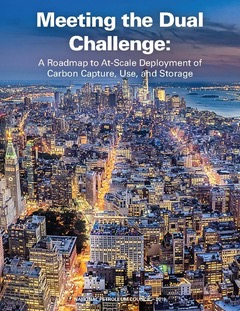About this Report
This report on carbon capture, use, and storage (CCUS) answers the Secretary of Energy's request for advice on the actions needed to deploy CCUS technologies at scale in the United States. The draft report was approved by the Council’s membership in December 2019 subject to final editing (copy edits, upgraded graphics, fact checks, and reformatting) and the draft sections and supporting materials were posted on this publicly accessible webpage for viewing and downloading. Each draft section is being replaced with a completed version as the above finalized process is done. On occasion, these completed versions will be replaced if a correction is identified. Therefore, readers are encouraged to check the date on the cover page showing when a document was posted to ensure that an earlier download is not out of date.
The report concludes that at-scale deployment requires strong collaboration between industry and government; improved policies, financial incentives, and regulations; broad-based innovation and technology development; and increased understanding and confidence in CCUS–to create a roadmap for achieving at-scale deployment over the next 25 years.
The report begins with an overview of the U.S. and global energy and CO2 emissions landscape, describing why CCUS is essential to meeting the dual challenge of providing affordable and reliable energy while addressing the risks of climate change. It then describes the opportunities to deploy CCUS in the United States and lays out a pathway through three phases of deployment—activation, expansion, and at scale—that would enable the growth of CCUS in the United States over the next 25 years and details the recommendations that enable each phase.
Implementing CCUS at scale is heavily reliant on the technologies that enable the processes. The report includes five chapters that describe each of the technology elements of the CCUS supply chain and the opportunities that exist for continued development. Expanding the deployment of CCUS to the scale described in this study will require more efficient integration of the existing suite of technologies, the development of new and emerging technologies to deliver new CCUS pathways, and a reduction in the cost of delivering CCUS solutions.
About the Study Participants
The Committee on Carbon Capture, Use, and Storage was composed of more than 60 members of the Council. The Committee's purpose was to conduct a study on this topic and to supervise preparation of a draft report for the Council's consideration. This Study Committee was led by a Steering Committee consisting of the Committee's Chair, Government Cochair, and nine members representing a cross section of the Committee.
A Coordinating Subcommittee and three analytical Task Groups were also established to assist the Committee in conducting the study and were aided by multiple Study Teams and Subgroups focused on specific subject areas supplemented by workshops and other outreach.
The members of the various study groups were drawn from NPC members' organizations as well as from many other industries, state and federal agencies, NGOs, other public interest groups, financial institutions, consultancies, academia, and research groups. Approximately 300 people served on the study's Committee, Subcommittee, Task Groups, Teams, and Subgroups. While all have relevant expertise for the study, less than 33% are from the oil and natural gas industry.
